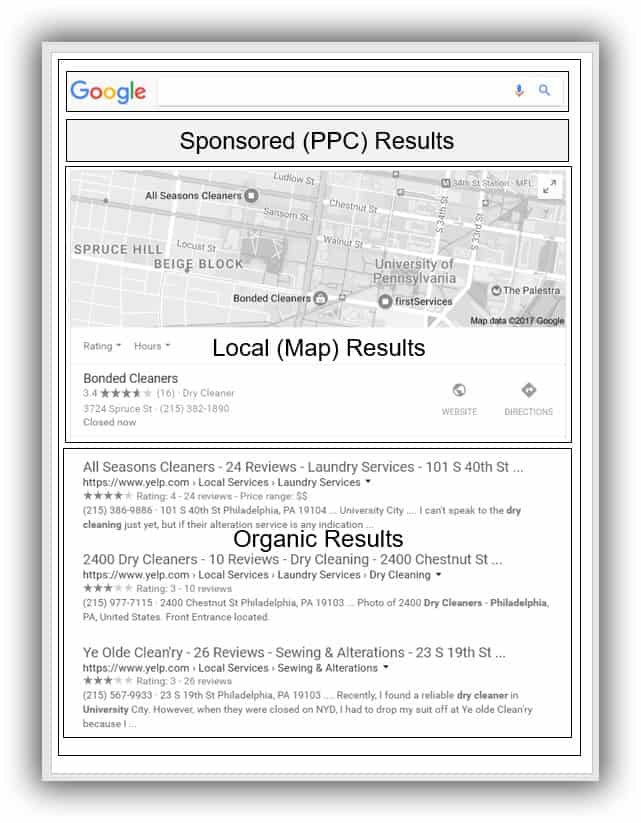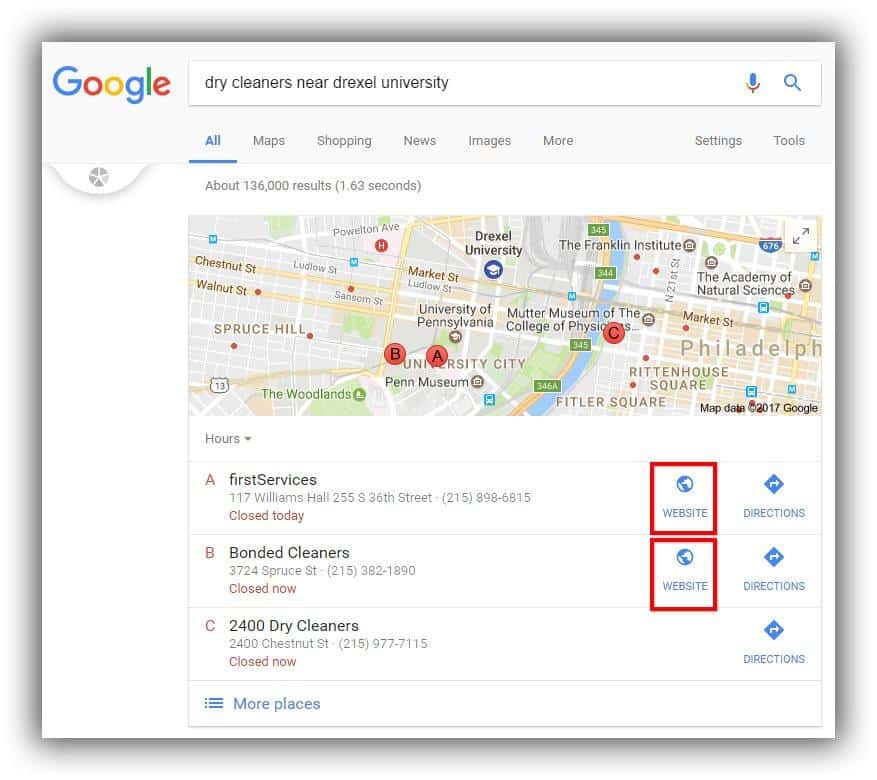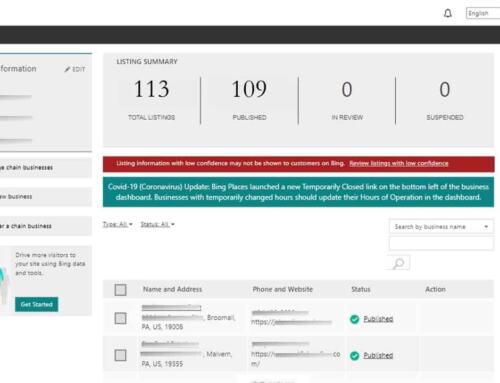Estimated Read Time: 7 Minutes
Last Updated: 12/28/2020
In a 2013 poll of more than 350 small business owners, Constant Contact found that most small business owners (85%) understood the importance of being found on major search engines, mobile device applications, and directory sites but close to half (49%) had seen errors in their listings and not bothered to update them.
A year later Search Engine Watch shared the results of a related study performed by Placeable. The Placeable study showed 73% of respondents lost trust or confidence in a brand or business when their online listings were incorrect.
“Brands that fail to ensure the accuracy of search engine location data run the risk of not only missing out on new customers, but jeopardizing their relationships with existing customers as well.”
Business listing errors erode trust. It is a problem for many businesses, but especially time and resource-strapped small business owners because there are hundreds of local business directories across the United States that could potentially need updating. It is labor-intensive, tedious, and time-consuming work.
The good news is local data aggregators can help.
What Are Local Data Aggregators?
Local data aggregators are large consumer and business data gathering companies that source, clean up, and distribute individual and business name, address, and phone number (NAP) data to publishers, marketers, and location-based service providers like search engines, review, and social media sites. If you get a direct mail solicitation, a phone call from a telemarketer, an e-mail or check-in offer, or a targeted online advertisement, there is a good chance the company behind it got its information about you from a local data aggregator.

Neustar Localeze is one of the largest data aggregators. This is their office location in Virginia. Image compliments of Google Maps
Search engines, mobile application developers, and local directory sites all get data from the local data aggregators. The local data aggregators are trusted sources of name, address, and phone number (NAP) data for every unique consumer and business in the United States.
What Do Local Data Aggregators Have To Do With Local Search?
I don’t know a business owner that does not want to rank at the top of Google search results.
There are three ways to do it:
- You can pay for an advertised spot at the top or bottom of search engine result pages (SERPs) using Google’s advertising platform also known as Sponsored Search Results, Adwords, and Pay-Per-Click (PPC).
- You can employ local SEO tactics to become eligible to appear in local (map) results for certain queries with local intent. Examples include “dry cleaners near Drexel University”, “dry cleaners 19104”, or just plain “dry cleaners” if the searcher is using a computer with an IP address in a ZIP code close to Drexel University (19104). Not every query will return local search results.
- You can earn your way to the top of organic search results for everything else.

Google’s ranking algorithm is a closely held secret and no one outside of that company knows exactly how it works. There is a general consensus among SEOs however, that the proximity of a business to the point of search and lots of high-quality local citations (online business mentions by name and address, name and phone number, or website) are key ingredients (among others) to gaining visibility on maps.
Google does not want to risk its reputation by recommending an untrustworthy business – a business with conflicting, inconsistent, or inaccurate information. This is where listing accuracy comes into play. Listing accuracy is one way Google decides whether to trust a local business and give it visibility in search results.
One of the easiest and least expensive ways to ensure listing accuracy is to employ the services of a local data aggregator or a local citation building service.
Who Are The Local Data Aggregators?
There are three main local data aggregators in the United States:
- Foursquare (foursquare.com);
- Data Axel (www.data-axle.com); and
- Localeze (www.neustarlocaleze.biz).
Data Axel was called Infogroup until September 2020 when the company rebranded.
There used to be a fourth data aggregator called Factual. Factual was acquired by Foursquare in April 2020 and all of Factual’s data sources and outputs were fully integrated into the Foursquare service by December of that year.
Acxiom is another name you might hear when data aggregators are mentioned. Acxiom was a major local data aggregator until the end of 2019 when the company retired its directory services. These recent data aggregator mergers and retirements, while concerning at first, have actually had little impact on business listing data distribution and helped simplify an already overly complex local search ecosystem. That’s because there was overlap in terms of which aggregators fed which directories. Removing Acxiom and Factual from the equation has not left a gap.
Are Data Aggregators the Same as a Citation Building Service?
Think of them as close cousins.
Citation building services are paid, third-party providers that acquire or clean up online mentions of business name, address, and phone number. Typically those mentions reside on online directories like Yellowpages, Yellowbook, Manta, Dunn and Bradstreet, and others. All these services include an offer to provide your data to local data aggregators who will, in turn, distribute your data to the directories in their extensive networks.
Citation building services can have a more extensive network of directories that also includes the local data aggregators. Depending on the service, your NAP data can be provided to hundreds of other online directories in addition to those fed by local data aggregators. They can be especially helpful when it comes to seeking out specialty and niche directories that can help boost your local business rankings.
There is a small and growing number of different citation building service providers in the United States. Pricing, breadth of services, and listing partners vary from service to service. Some offer a one-time service that’s useful you don’t plan on moving or changing your phone number in the foreseeable future. Others provide an annual service which is particularly useful if you do plan on changing your name, address, and/or phone number on a regular basis. It’s also helpful when you want to limit your spend. (It’s more expensive in the short-term to go for the one-time listing service.) Which service is best will depend on your business situation, budget, and objectives.
Why Use a Citation Building Service?
Why pay for a citation building service when you can go directly to most of the data aggregators and not have to pay?
There are four advantages to using a citation building service:
- They streamline, lower the cost, and simplify the process of acquiring citations.
- They help identify NAP errors and inconsistencies so you have an opportunity to fix them before your data gets distributed.
- They capture and distribute additional data that can help increase click-thru and conversion rates for your local business listings.
- A one-stop shop best ensures data consistency across the board. Consistency is essential to Google being able to associate the right citations with your business.
Citation building services give you a single pathway to all the local data aggregators. You enter your data once; it gets validated, standardized, and reformatted, and then distributed to all the local data aggregators and others, should you choose to go beyond just the local data aggregators.
Local data aggregators get their data from a wide variety of sources. They do a decent job identifying duplicates, errors, and inconsistencies but are often not good enough. Better citation building services highlight these potential problems and give you an opportunity to fix them before your data goes to the local data aggregators and gets propagated throughout the entire local search ecosystem.
Data consistency and accuracy are key to local search success. Search engines need a way to differentiate one business from another. They use the business name and address or name and phone number data to tell one business from another. If your NAP data is inconsistent, outdated, or inaccurate, you will not get credit for all your citations and you will lower your ranking potential. All things being equal, the more (and more consistent and accurate) citations you have coming in from reputable sources, the higher you will rank.
Citation building services also give you the opportunity to add supplemental data – things like a business description, tagline, your website address, images, hours of operation, accepted payment types, and social media links. This data also gets channeled to local data aggregators and any downstream local business directories that accept it. This data can enrich and differentiate your business listing in a crowded marketplace. That can translate into increased click-thru rates and visits to your place of business or website.

The ability to display your business website increases the potential for website visits.
Local Data Aggregators Are But One Piece of the Local Search Puzzle
Local data aggregators feed business name, address, and phone number data to hundreds of local directories across the United States. While useful, you’re still better off using one of the local citation building services to add and maintain your listing data because they not only feed the local data aggregators, they also give you access to other directory listings and streamline and simplify the entire process for less cost.
You can compare different citation-building services here.







Do you have any idea where these aggregators distribute their data to? I’ve been trying to find a source that shows all of the end points / partners where they distribute…?
Unfortunately no, at least not in detail. I remember looking for an answer to that question at one time but I think each aggregator considers that proprietary information.
I worked closely with Acxiom for some years in a different role. They had many, many clients that accessed the data for a whole variety of reasons (financial services, insurance, information services, direct marketing, media, retail…), not just directory listings.
The best overview of who distributes what where that I have seen is the ecosystem diagram that Moz maintains. It only highlights major directories, but it’s a start.
Last Updated: 01/19/21
“… where these aggregators distribute their data to”. The Local Search Ecosystem diagram is now dynamic and maintained by a company called Whitepark, a local SEO services company in Edmonton Alberta, Canada. Here’s a link to the diagram – https://whitespark.ca/local-search-ecosystem/. It is really useful in helping you ID where aggregators distribute their data to. Hope it helps.